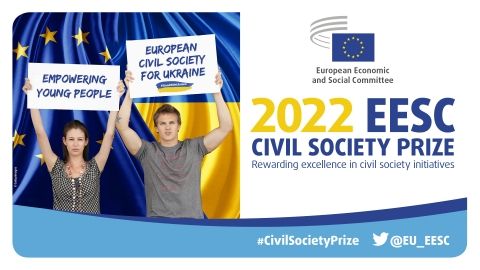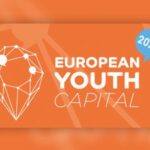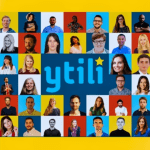Creating a better future for young people and helping Ukrainian war victims are the two themes of this year’s EESC Civil Society Prize
The European Economic and Social Committee (EESC) is now accepting applications for its Civil Society Prize 2022 which will reward innovative and creative projects and initiatives in two categories: empowering young people and helping Ukrainian civilians affected by the terrible events in their war-torn country.
A total of EUR 60 000 will be awarded to a maximum of six winners, with three winners per category. The award ceremony will take place during the EESC plenary session in Brussels on 14-15 December 2022.
The deadline for entries is 10 a.m. (Brussels time) on 31 July 2022.
The projects must have already been implemented or still be ongoing. Those which are planned but which have not begun implementation by 31 July 2022 will be excluded.
The prize is open to all civil society organisations, individuals and private companies carrying out non-profit initiatives. Organisations and companies must be officially registered within the EU whereas individual applicants have to be either EU citizens or third-country nationals residing in the EU.
All initiatives and projects must be carried out in the EU, with the exception of the projects in Category 2 (European civil society for Ukraine) which can also be carried out in Ukraine.
The full description of requirements and the online application form are available on our webpage.
The aim of the EESC’s flagship Civil Society Prize is to raise awareness of civil society’s outstanding contribution to creating a European identity and citizenship and to promoting the common values that bolster European integration.
Now in its thirteenth year, the prize focuses on a different theme particularly relevant to the EU each year.
Category 1: Youth are our future, but also our present
The theme of Category 1 is empowering young people.
In the European Year of Youth, the EESC would like to flag up the immense importance of meaningful engagement of young people and youth organisations in decision-making processes, which will in turn ensure the stability and resilience of European democracies.
By dedicating a prize to this category, the EESC wants to highlight the contribution that young people can make to shaping Europe’s future and the pressing need to give them the opportunity to become active citizens and actors of positive change in the economy and society. This is all the more important now, as young people have been disproportionately affected by the economic and societal consequences of COVID-19.
The EESC will therefore choose the winners from among the projects which aim to create a better future for and with young people in Europe. They should be tackling the specific needs of young Europeans and contributing to their empowerment and participation in economic and social life.
Eligible entries must cover at least one of the following areas: employment and access to the labour market, including entrepreneurship; education and training; health and wellbeing, in particular as a consequence of the COVID-19 pandemic; participation in political processes, including matters such as climate change and new technologies; empowering vulnerable groups and capacity building of young multipliers.
Category 2: Joining hands for Ukraine
The theme of Category 2 is European civil society for Ukraine. The prize will honour effective, innovative and creative initiatives which aim to help civilians suffering as a result of the war.
One of the EESC’s current priorities is protecting people in Ukraine. The EESC insists that all refugees must receive adequate and timely protection. Organised civil society has already shown that its role in this context is pivotal. In many countries, it has mobilised overnight and is cooperating with the authorities to help both people in Ukraine and Ukrainians who have fled to other countries.
While expressing its profound grief for all the victims of the aggression, for the destruction of Ukrainian cities and infrastructure, and for the incalculable human suffering and environmental damage, with this prize the EESC would like to pay tribute to all those active on the ground who offer humanitarian assistance to Ukrainians on a day-to-day basis and who aid refugees both upon arrival and during their integration into European society.
Projects eligible for the prize can cover a wide range of themes, such as providing humanitarian aid, shelter or emergency relief; providing social, psychological or administrative support; helping Ukrainian refugees integrate into host countries, for example by offering language training or help with finding employment; helping vulnerable people; combating disinformation about the war in Ukraine.
A more detailed but non-exhaustive list of possible project topics for both categories is available at the dedicated EESC webpage.
Previous Civil Society Prizes
In 2021, the prize rewarded climate projects promoting a just transition. In 2020, the EESC replaced its Civil Society Prize with a one-off Civil Solidarity Prize dedicated to the fight against COVID-19. Other topics in the past included gender equality and women’s empowerment, European identities and cultural heritage, and migration.
We would ask you to encourage civil society organisations in your country to apply for the EESC Civil Society Prize 2022 and thus help valuable projects win recognition.







Leave a Reply